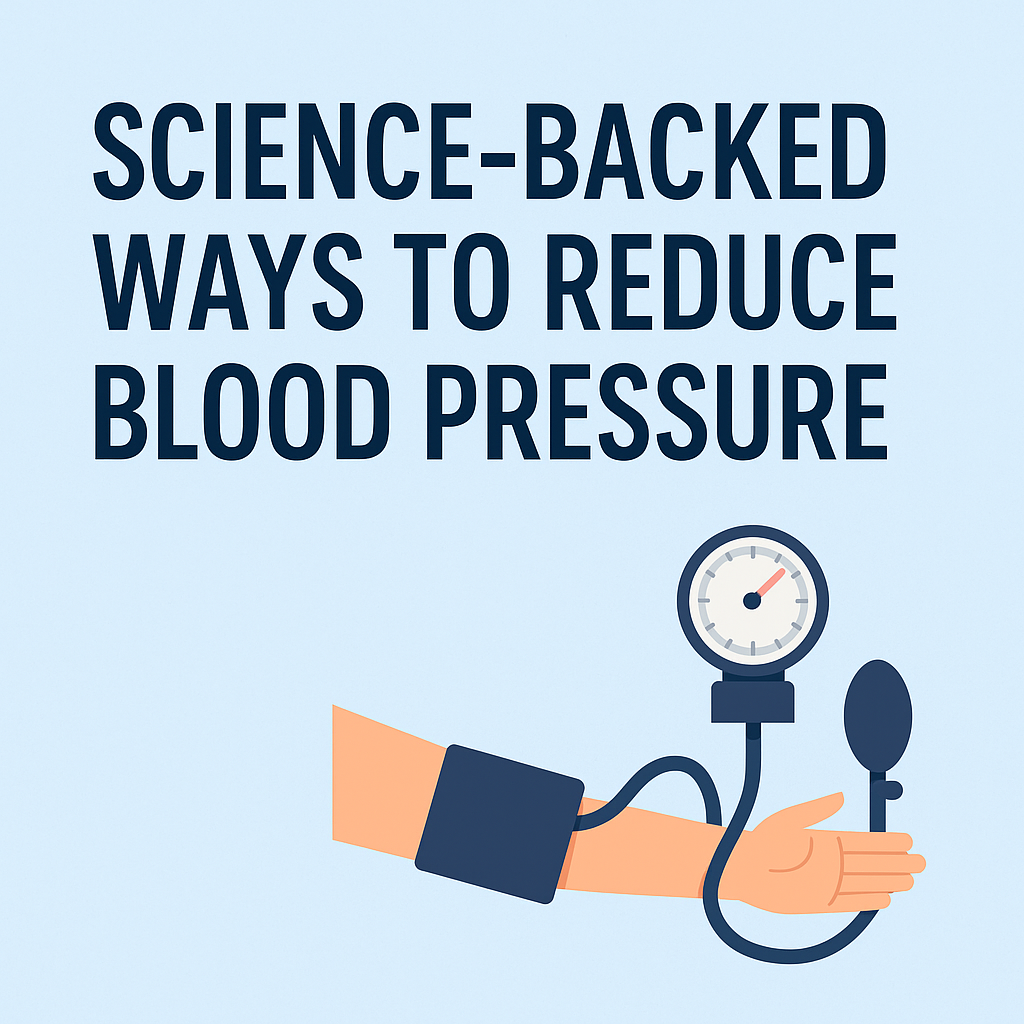High blood pressure (hypertension) affects more than 1 billion people worldwide and is one of the leading risk factors for heart disease, stroke, and kidney problems. While medications are often necessary, there is strong scientific evidence that lifestyle changes can significantly reduce blood pressure and improve long-term health outcomes.
Here are the most effective, science-backed strategies to reduce blood pressure naturally.
1. Follow the DASH or Mediterranean Diet
The DASH diet (Dietary Approaches to Stop Hypertension) was specifically designed to lower blood pressure. It emphasizes fruits, vegetables, whole grains, lean proteins, legumes, nuts, and low-fat dairy, while reducing red meat, sugar, and saturated fats.
-
Clinical trials show the DASH diet can lower systolic blood pressure by 8–14 mmHg — comparable to a first-line medication in some cases (NEJM, 1997).
-
Similarly, the Mediterranean diet, rich in olive oil, fish, vegetables, and whole grains, has been linked to lower blood pressure and reduced cardiovascular events (PREDIMED Trial, NEJM, 2013).
2. Reduce Sodium, Increase Potassium
High sodium intake is a major contributor to elevated BP.
-
Reducing sodium to <2,300 mg/day and ideally to 1,500 mg/day for hypertensive patients significantly lowers BP (Aronow, 2017).
-
Increasing potassium from fruits, vegetables, and legumes helps counter sodium’s effect and relaxes blood vessels (Aburto et al., BMJ, 2013).
Foods rich in potassium: bananas, avocados, spinach, beans, and sweet potatoes.
3. Maintain a Healthy Weight
Excess body weight strains the heart and blood vessels.
-
Research shows that for every 10 kg (22 lbs) of weight lost, systolic BP can fall by 5–20 mmHg (Neter et al., Hypertension, 2003).
-
Even modest weight loss of 5–10% body weight improves BP control.
4. Exercise Regularly
Physical activity improves blood vessel flexibility and lowers stress hormones.
-
The American Heart Association recommends 150 minutes of moderate aerobic exercise per week (AHA Guidelines).
-
Regular aerobic exercise can reduce systolic BP by 5–8 mmHg (Cornelissen & Fagard, Hypertension, 2005).
-
Strength training 2–3 times weekly adds further benefits.
5. Try Isometric Handgrip Exercises
A lesser-known but effective method for reducing blood pressure is isometric handgrip training.
-
This involves squeezing a small handgrip device or even a soft ball at 30% of maximum strength, for 2 minutes at a time, 4 sets per hand, 3 times a week.
-
Studies show isometric handgrip exercises can reduce systolic BP by 5–10 mmHg and improve arterial function (Garg et al., J Clin Diagn Res, 2017).
-
It’s safe, requires minimal effort, and can be done at home while watching TV or working at a desk.
6. Limit Alcohol and Quit Smoking
-
Drinking in moderation: ≤1 drink/day for women, ≤2 for men. Excessive alcohol raises BP by 5–10 mmHg (Briasoulis et al., J Clin Hypertens, 2012).
-
Smoking causes immediate increases in BP and damages arteries. Quitting smoking improves overall cardiovascular health (Primatesta et al., Hypertension, 2001).
7. Manage Stress
Chronic stress activates the sympathetic nervous system, raising BP.
-
Relaxation practices such as meditation, yoga, tai chi, or deep breathing have been shown to modestly lower BP.
-
A meta-analysis found meditation reduced systolic BP by ~4–5 mmHg (Park & Han, J Alt Complement Med, 2017).
8. Improve Sleep Quality
Poor or insufficient sleep is strongly associated with hypertension.
-
Adults should aim for 7–8 hours of quality sleep per night.
-
Sleep apnea, if untreated, can worsen hypertension; CPAP therapy improves BP in affected patients (Haentjens et al., Arch Intern Med, 2007).
9. Consider Specific Supplements (With Medical Guidance)
Some supplements have evidence for supporting BP control:
-
Potassium: lowers BP if deficient (Chan et al., Hypertension, 2024). But patients with kidney diseases need to be super cautious. Never start potassium without consulting your physician.
-
Magnesium: may reduce systolic and diastolic BP modestly (Dibaba et al., Am J Clin Nutr, 2017).
-
Coenzyme Q10 and Omega-3 fatty acids show benefits in some studies.
⚠️ Always consult a doctor before starting supplements, especially if taking medications.
✅ Key Takeaway
Blood pressure can be substantially reduced through diet, exercise, stress management, and lifestyle changes. In many cases, these measures work as effectively as medication — and enhance overall heart and metabolic health.
By combining the DASH diet, sodium reduction, regular physical activity, weight management, stress control, and quality sleep, you can lower your blood pressure, reduce the need for medications, and protect your heart for the long term.
📚 Reference List
-
Appel LJ, Moore TJ, Obarzanek E, et al. A Clinical Trial of the Effects of Dietary Patterns on Blood Pressure (DASH Trial). N Engl J Med. 1997;336:1117-1124.
-
Estruch R, Ros E, Salas-Salvadó J, et al. Primary Prevention of Cardiovascular Disease with a Mediterranean Diet (PREDIMED Trial). N Engl J Med. 2013;368:1279-1290.
-
He FJ, MacGregor GA. Salt, blood pressure and cardiovascular disease. Curr Opin Cardiol. 2007;22(4):298-305.
-
Aburto NJ, Hanson S, Gutierrez H, et al. Effect of increased potassium intake on cardiovascular risk factors and disease: systematic review and meta-analyses. BMJ. 2013;346:f1378.
-
Neter JE, Stam BE, Kok FJ, et al. Influence of weight reduction on blood pressure: a meta-analysis of randomized controlled trials. Hypertension. 2003;42(5):878-884.
-
American Heart Association. Recommendations for Physical Activity in Adults.
-
Cornelissen VA, Fagard RH. Effects of endurance training on blood pressure, blood pressure-regulating mechanisms, and cardiovascular risk factors. Hypertension. 2005;46(4):667-675.
-
Cornelissen VA, Smart NA. Exercise training for blood pressure: a systematic review and meta-analysis. J Hypertens. 2013;31(6):1077-1091.
-
Briasoulis A, Agarwal V, Messerli FH. Alcohol consumption and the risk of hypertension in men and women: a systematic review and meta-analysis. J Clin Hypertens. 2012;14(11):792-798.
-
Primatesta P, Falaschetti E, Gupta S, et al. Association between smoking and blood pressure: evidence from the Health Survey for England. Hypertension. 2001;37:187-193.
-
Park SH, Han KS. Blood pressure response to meditation and yoga: a systematic review and meta-analysis. J Altern Complement Med. 2017;23(9):685-695.
-
Rainforth MV, Schneider RH, Nidich SI, et al. Stress reduction programs in patients with elevated blood pressure: a systematic review and meta-analysis. Curr Hypertens Rep. 2007;9(6):520-528.
-
Haentjens P, Van Meerhaeghe A, Moscariello A, et al. The impact of continuous positive airway pressure on blood pressure in patients with obstructive sleep apnea: a meta-analysis of randomized controlled trials. Arch Intern Med. 2007;167(8):757-764.
-
Chan Q, Yin P, Zhao L, et al. Association of potassium intake with blood pressure and cardiovascular disease. Hypertension. 2024;81:148-158.
-
Kass L, Weekes J, Carpenter L. Effect of magnesium supplementation on blood pressure: a meta-analysis. Eur J Clin Nutr. 2012;66(4):411-418.
-
Cicero AFG, Colletti A, Borghi C. Nutraceuticals and blood pressure control: a systematic review and meta-analysis of randomized clinical trials. Br J Clin Pharmacol. 2012;74(4):602-612.

Akanksha Sharma
Dr. Akanksha Sharma, Head Writer and creator of AtoZ of Pregnancy, is dedicated to empowering women, parents, and families through 360-degree knowledge. She and her team provide evidence-based advice to guide families through pregnancy, parenting and beyond.






